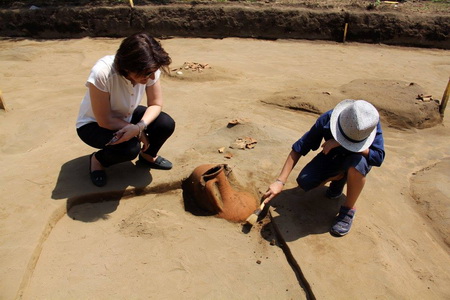Archaeologists reveal fresh findings at ancient Pichvnari settlement on Black Sea coast

The latest findings at western Georgia's Pichvnari excavation site have given historians material to enrich their studies of ancient Black Sea settlements following a series of recent discoveries in the region.
Announced by Adjara regional Ministry of Education, Culture and Sport on Friday, the findings unearthed by archaeologists include ceramic pieces, decorative objects and farming instruments.
In particular, experts noted a floor surfaced with bassanite material and a stone-made sinker used in farming, unveiled among remains of the settlement dating back to the 6th-4th centuries BC.

Decorative, farming and household items were among findings on the Pichvnari site. Photo: Adjara Ministry of Education, Culture and Sport press office.
On the site of a nearby burial ground, archaeologists excavated golden beads, a terracotta ceramic piece featuring a wild boar illustration and "imported" clay vessels.
Beside the settlement and burial site remains, archaeologists are also working at a nearby site of a 5th century BC Greek necropolis in Pichvnari, with "contours" of burial sites found at the upper layer of the excavation site.
Located 10km north of the seaside town Kobuleti, Pichvnari is the contemporary name for an ancient settlement which first presented archaeologists with findings of 4th century BC silver drachma coins in 1951.

A clay vessel discovered on the site. Photo: Adjara Ministry of Education, Culture and Sport press office.
Further findings on the site included nearly 300 coins dating back to the 6th to 4th centuries BC and representing the Colchis ancient Kingdom.
Planned excavations started in the area in 1955, with further digs following in the 1960s. Suspended in the early 1990s, works were restarted in 1998 within the joint British-Georgian Pichvnari Expedition and continued in the 2000s.
The works carried out at Pichvnari since the mid-20th century have revealed an advanced industrial society in the area by the 1st century BC.
Historians said discoveries suggested active trade relations between the settlement and kingdoms and towns in western Asia, the Balkans, North Caucasus and Crimea.

The site of the excavations at Pichvnari. Photo: Adjara Ministry of Education, Culture and Sport press office.
Sites of ancient Black Sea settlements have given archaeologists a series of findings over the recent years.
Last month, excavations at the 535 CE Petra Fortress returned weapons, household items, work instruments and human remains for experts.
The exhibits indicated a battle within the 541-562 CE Lazic War for the ancient Egrisi Kingdom between the Sasanian and Byzantine empires.
In 2015, remains of Roman barracks were unearthed in the final stage of excavations at Gonio Fortress near Georgia's border with Turkey.
The same year, floor mosaics supposedly dating back to the rule of the Roman emperor Vespasian through 69-79 AD were also found by a joint Georgian-Polish team within the remains of the fort.
 Tweet
Tweet  Share
Share